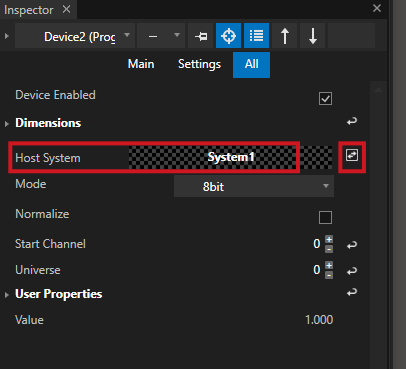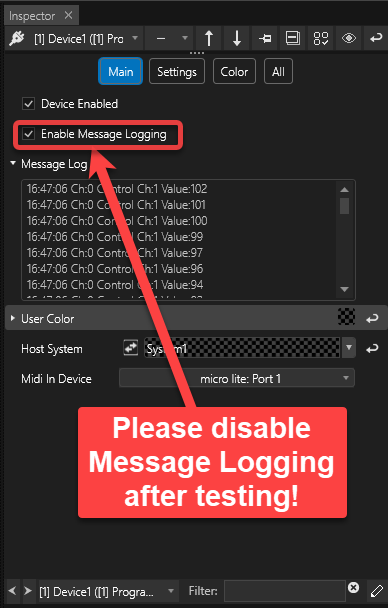•Control different types of external devices directly from VERTEX
•Select a device from library and add it to your project
•Set device parameters with script commands or from the Inspector window
Workflow
VERTEX features an abstract device model that enables users to control various types of devices.
Some of the device properties can be animated via keyframes like the ones of DMX-Devices for instance.
Also, all device parameters are accessible with VERTEX script commands.
Regardless of the device type and its range of parameters, the basic workflow is always the same:
1.Open the library editor and search for a device
2.Add the device to your project
3.Select device in the project explorer
4.Do connectivity and protocol settings in Inspector
5.Access device parameters with vertex script commands
or
6. use a device in a clip container
Troubleshooting: Reconnect a Device
Devices in Library Editor
•Open the library
•Search for the device you want to use
use the search filter and search by names
•Right-click with your mouse and select whether you want to add only one or multiple devices to your project
 Directory and Folder for Devices
Directory and Folder for Devices
You are able to write your own device templates and add them to the VERTEX library.
You have to save your custom devices with the file extension .vxdi
Devices that come with VERTEX are encrypted in .vxdx format
Directory and Folder:
C:\Users\Public\Documents\ioversal\Vertex\[Vertex Assembly Version]\Devices
You are allowed to create own subfolders or copy your device into an already existing subfolder
Devices in Project Explorer
The Devices manager in the Project Explorer contains every device that has been added to your project .
Depending on the device type, a connection status is shown:
Red: connection refused or not possible
Orange: trying to establish connection
Green: connected
Connection settings like ports or IP Address could be done in the inspector.
 Connection status into Project Explorer only for certain types of Devices
Connection status into Project Explorer only for certain types of Devices
Some device types like DMX Devices or TCP Senders do not have a connection status by device design
For this Devices the status is not shown into Project Explorer
Connectivity and Protocol Settings
Select a Device in the project explorer and do the connectivity and protocol settings in the inspector.
Within the device library that is shipped with VERTEX, our team has tested the connectivity for most of the included devices. All connectivity and protocol settings are set according to the manufacturer's specification.
If you have problems to connect one of the devices, don't hesitate to contact VERTEX Support (vertex.support@rossvideo.com) or open a ticket directly from within VERTEX (Main Menu -> help --> Create new Ticket).
Use Devices with Script Commands
Each device from a manufacturer has its own parameters and options.
This options and parameters are accessible with VERTEX Script commands.
Use script commands in cues, clip containers, on system startup, in a playlist,
or in a trigger editor to script your device interaction.
For some kind of devices - like DMX Devices also keyframe animation is possible.
For some devices (like e.g. the Elgato Stream Deck) you only have to do the global settings into Inspector to work with.
Use Device as a Clip Container
Some Devices like DMX Dimmer and DMR RGB devices could be animated with keyframes.
Just drag the device from project explorer with your mouse and drop it into the playback editor.
A clip container is created.
Connection Problems - Host System and Reconnect
•If there are connection problems with your device, please try a reconnect first of all.
•Select your device in the inspector
•Every Device has a property for Host System (The VERTEX system your device is connected to). Please first check is this is correctly set
If not and if you are working with multiple systems, drag another system from project explorer to this property field.
•Next to this property, there is a reconnect button that refreshes to connection to this device.
Reconnect by Script
•A reconnect also is possible by script with the command ResetConnection
Device1.ResetConnection
Logging Device Data
Some devices can log incoming messages for testing purposes. However, we strongly recommend to disable this feature when going live so that you won't use too much bandwidth for all that controller data. This is especially important for CAN-Bus, Ixxat, KNX & MIDI INPUT devices.






